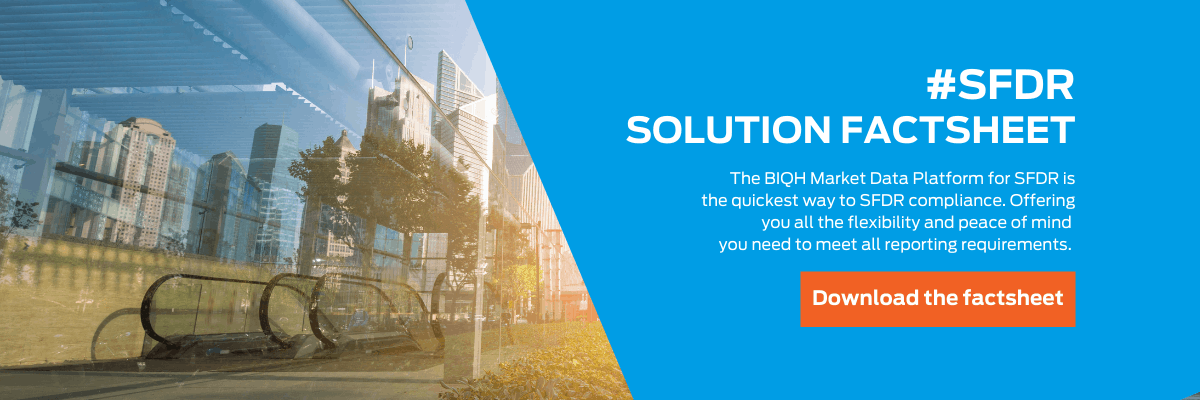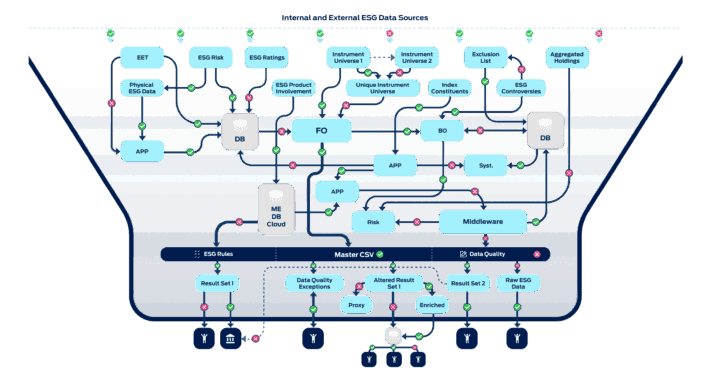What you should know about the new Sustainable Finance Disclosure Regulation [SFDR]

As of March 2021 the new Sustainable Finance Disclosure Regulation [SFDR] came into effect. This regulation is developed to drive sustainable investment. The SFDR will have big impact on asset managers, banks and fund brokers. We offer you a complete blog series focusing on the SFDR, the timelines, the definitions, the indicators and the Adverse Sustainable Impacts Statement to help you get your head around the subject. In our blog posts we focus on the impact of this regulation to you as a Financial Market Participant to ensure you are well prepared for the new regulation.
This blog post was first published on October 6, 2020 and updated on August 25, 2021.
The origin of SFDR
In December 2015, 195 countries signed the Paris Agreement to adapt to climate change. According to the European Commission [the Commission], sustainability and the transition to a low-carbon, more resource-efficient and circular economy are key in ensuring long-term competitiveness of the EU economy.
The UN 2030 Agenda sets out 17 Sustainable Development Goals [SDG’s] on how to flesh out concepts of the Paris Agreement in the roadmap until 2030. The European Commission has set out a Sustainable Finance Action Plan [SFAP] in 2018 to build on these set goals. The SFAP connects finance with the specific needs of the European and global economy, this for the benefit of the planet and our society. The Plan proposes a list of actions to set out an EU strategy for sustainable finance. The SFAP aimed to:
- Reorient capital flows towards sustainable investment in order to achieve sustainable and inclusive growth;
- Manage financial risks stemming from climate change, resource depletion, environmental degradation and social issues; and
- Foster transparency and long-termism in financial and economic activity.
This action plan has resulted in three new regulations:
- EU Regulation 2019/2088 on sustainability‐related disclosures in the financial services sector, which will be referred to as the SFDR;
- EU Regulation 2019/2089 amending Regulation (EU) 2016/1011 regards EU Climate Transition Benchmarks, EU Paris-aligned Benchmarks and sustainability-related disclosures for benchmarks, which will be referred to as the Benchmark Regulation; and
- EU Regulation 2020/852 on defining a common language and a clear definition of what ‘sustainable’ is, which will be referred to as the Taxonomy Regulation.
A renewed sustainable finance strategy has come into effect in 2019 with the publication of the European Green Deal. It sets out a framework with policy tools that go beyond the original SFAP. This initiative actively lays out an investment plan to make the Union carbon neutral in 2050. It builds on previous initiatives and reports, such as the SFAP.
In this blog series though, we will focus on the first regulation mentioned, because the SFDR will have the most direct impact on financial markets.
What is the SFDR?
The SFDR is a set of sustainability-related disclosure obligations for Financial Market Participants [FMPs] and Financial Advisers. In our blog posts we will focus on the impact and obligations of this regulation on FMPs. The first details of the SFDR requirements were published by the European Supervisory Authorities [ESAs] in April 2020 in a consultation paper. Recently in February 2021, the ESAs published their final report on the draft Regulatory Technical Standards [RTS]. This report fleshes out the standards on content, methodologies and presentation of disclosures as required by the SFDR. The draft RTS provides specific templates for disclosing indicators that have a negative influence on sustainability (the Principal Adverse Impact Statement), for pre-contractual disclosures and periodic reports.
When is the SFDR coming to effect?
The Sustainable Finance Disclosure Regulation will impose substantial reporting duties on Financial Market Participants [FMPs]. The effective date for the obligations that are stated in the SFDR itself (the so-called Level 1 requirements) is March 10, 2021. The first reference period will start on January 1, 2022. This is also the starting point for the obligations that follow from the RTS, the Level 2 requirements, though most recently this deadline has been delayed to 1 July 2022. Reporting requirements and publication schedules vary per type of FMP and the investment product or service that are offered.

What to expect as Financial Market Participant
To be able to comply with the SFDR obligations, a FMP needs access to all sorts of data that at this moment is often not available yet. Not only traditional types of market data are needed for reporting (such as reference, portfolio and pricing data) but the required metrics most often involve non-financial data like CO2 emissions and other specific Environmental, Social & Governance [ESG] data.
The devil is in the data
Based on the template of Annex I on the Principal Adverse Impacts Statement of final draft RTS, it is clear that in order to comply with the regulation an FMP will need to:
- Collect data from various (new) data sources including (but not limited to): data providers with data on company level, financial product level, entity level as well as data from fund administrators, fund management companies and proprietary data sources;
- Formulate and collect textual commentaries and explanations, quite often in multiple languages, on topics like adherence to international standards, engagement policies and a description of policies to identify and prioritize principal adverse sustainability impacts;
- Map data from various sources into a singular and robust data model for aggregation, calculation and comparability purposes;
- Perform various data quality checks;
- Be transparent on the coverage or the availability of data needed to comply with the reporting obligations; and
- Have look-through data for mutual funds and ETFs available; and
- Produce, publish and disseminate raw data, aggregated and normalized data, documents and periodic reports (e.g. the annual report of a mutual fund).
How to get started with the SFDR?
BIQH is highly specialized in financial market data logistics, servicing large retail and private banks, asset managers and the funds industry. Through the BIQH Platform we enable our clients with data logistics and data management. Our data platform improves a streamlined reporting process and assists our clients to comply with regulations like MiFID II and SFDR. It is our goal to provide our clients with maximum flexibility no matter the data source and provider of the market data.
In addition, we assist our clients with our extensive knowledge and experience in relation to client and regulatory reporting processes. Throughout this series of blogposts related to the SFDR regulation we will focus on:
- The progress of the implementation of this regulation by the EU and the ESAs;
- The timelines and roadmap of the SFDR;
- Which stakeholders are impacted by SFDR and the reporting obligations it imposes to them; and
- More specifically the (ESG) data requirements and technical aspects of the SFDR.
We are always open for a chat and we encourage discussions, especially when it comes to financial market data. Let us know your challenges, questions and uncertainties relating to the Sustainable Finance Disclosure Regulation.



